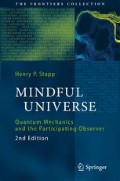Abstract
Eugene Wigner introduced the term ‘orthodox’ to describe von Neumann’s formulation of quantum theory. I use the term more broadly to include, at the pragmatic level, also the Copenhagen formulation. But at the ontological level I mean the von Neumann–Tomonaga–Schwinger description that includes the entire physical universe in the physically described quantum world, and that accepts the occurrence of the process 1 interventions in the process 2 evolution of the physically described state of the universe.
Access this chapter
Tax calculation will be finalised at checkout
Purchases are for personal use only
Preview
Unable to display preview. Download preview PDF.
References
Bohm, D. (1952): A suggested interpretation of quantum theory in terms of hidden variables. Physical Review 85, 166–179
Bohm, D.J. (1986): A new theory of the relationship of mind to matter. The Journal of the American Society for Psychical Research 80, 113–135
Bohm, D.J. (1990): A new theory of the relationship of mind to matter. Philosophical Psychology 3, 271–286
Einstein, A. (1951): Remarks to the essays appearing in this collected volume. In: Albert Einstein: Philosopher–Physicist, P.A. Schilpp (Ed.) (Tudor, New york)
Joos, E. (1996): Introduction. In: Decoherence and the Appearance of a Classical World in Quantum Theory, D. Giulini et al. (Eds.) (Springer, Berlin, Heidelberg, New York)
Pearle, P. (2005): Quasirelativistic quasilocal finite wave function collapse model, Physical Review A 71, 032101. http://arxiv.org/abs/quant-ph/0502069
Stapp, H.P. (2002): The basis problem in many-worlds theories, Canadian Journal of Physics 80, 1043–1052
Stapp, H.P. (2006b): Quantum approaches to consciousness. In: Cambridge Handbook of Consciousness, M. Moskovitch and P. Zelazo (Eds.). http://www-physics.lbl.gov/%20stapp/stappfiles.html
Stapp, H.P. (2007a): Quantum mechanical theories of consciousness. In:Blackwell Companion to Consciousness, M. Velmans and S. Schneider (Eds.)
Zeh, H.D. (1996): The program of decoherence: Ideas and concepts. In: Decoherence and the Appearance of a Classical World in Quantum Theory, D. Giulini et al. (Eds.) (Springer, Berlin, Heidelberg, New York)
Zurek, W.H. (2002): Decoherence and the transition from quantum to classical – revisited, Los Alamos Science, 27 November, 2–25. arXiv/quant-ph/0306072
Author information
Authors and Affiliations
Corresponding author
Rights and permissions
Copyright information
© 2011 Springer-Verlag Berlin Heidelberg
About this chapter
Cite this chapter
Stapp, H.P. (2011). Non-Orthodox Versions of Quantum Theory and the Need for Process 1. In: Mindful Universe. The Frontiers Collection. Springer, Berlin, Heidelberg. https://doi.org/10.1007/978-3-642-18076-7_10
Download citation
DOI: https://doi.org/10.1007/978-3-642-18076-7_10
Published:
Publisher Name: Springer, Berlin, Heidelberg
Print ISBN: 978-3-642-18075-0
Online ISBN: 978-3-642-18076-7
eBook Packages: Physics and AstronomyPhysics and Astronomy (R0)

